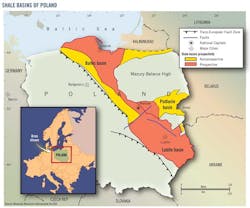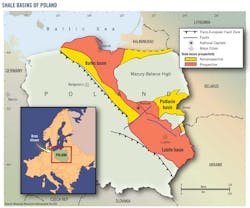UNCONVENTIONAL OIL & GAS FOCUS: Poland shale gas could change European supply mix
Poland's push toward exploration, development, and anticipated production of shale gas appears to have become almost a national mission for the European nation seeking to break its reliance upon conventional Russian natural gas and to eventually become a supplier to the European gas market.
Polish Prime Minister Donald Tusk suggests Poland will achieve what he calls "gas security" by 2035. He based this projection on Polish state-controlled gas firm PGNiG SA's plans for commercial shale production starting in 2014.
"After years of dependence on our large neighbor [Russia], today we can say that my generation will see the day when we will be independent in the area of natural gas, and we will be setting terms," Tusk said while on the campaign trail ahead of his Oct. 9 reelection.
PGNiG flared a shale gas well at Lubocino in northern Poland earlier this year. The company plans horizontal drilling and hydraulic fracturing.
"If the work goes according to plan, trial production could be possible in the second half of 2013, with commercial production starting in 2014," PGNiG said in a September statement.
Geologists estimate shales in Poland and other Eastern European countries could contain massive gas resources. Eastern Europe is heavily dependent on gas imports from Russia's OAO Gazprom. Poland consumes 14 billion cu m/year of gas of which about 9 billion cu m/year comes from Russia.
Richard Morningstar, special envoy of the US Secretary of State for Eurasia, said the US needs to support Poland's shale development efforts in its goal to become a European gas supplier.
An advocate of Poland's goal to help ensure European and global energy security, Morningstar told an Oct. 19 energy conference at Rice University's Baker Institute that shale is "not a magic bullet" for Poland or Europe. Shale projects can take years, he noted.
Some energy analysts suggest it will be at least a decade before Poland could begin significant gas production from shale because of the country's need to build pipelines and midstream assets.
Tusk calls shale the country's "great chance" to reduce Poland's dependence on Russia for gas, create thousands of jobs, and increase government revenue.
The US Energy Information Administration estimates Poland could have some 5.3 trillion cu m of technically recoverable resources, which is believed to be the largest shale resources in Europe.
The EIA report also identified France as having large shale gas potential. Both Poland and France rely heavily on imported gas.
Unlike the French government's moratorium on shale exploration, the Polish government encourages US, Canadian, and European companies to explore for shale. ExxonMobil Corp., Chevron Corp., ConocoPhillips, and Marathon Oil Corp. are among a host of companies having exploration licenses to Poland's three shale basins: the Baltic in the north, the Lublin in the south, and the Podlasie in the east (see map).
Almost 30 companies are working on shale projects in Poland, where the government has issued more than 100 exploration licenses to help build gas reserves and diversify from its heavy reliance on Russian gas, Beata Stelmach, Poland's undersecretary of state, Ministry of Foreign Affairs, told the Baker Institute energy conference.
The EIA released an April report on global shale gas resources saying shale exploration permits also have been issued in the Netherlands, Germany, UK, Sweden, Hungary, Switzerland, and Ukraine.
Poland at 120,000 sq miles is 2.3 times the size of the Fort Worth basin in North Texas.
Displaying 1/3 Page 1, 2, 3Next>
View Article as Single page
About the Author
Paula Dittrick
Senior Staff Writer
Paula Dittrick has covered oil and gas from Houston for more than 20 years. Starting in May 2007, she developed a health, safety, and environment beat for Oil & Gas Journal. Dittrick is familiar with the industry’s financial aspects. She also monitors issues associated with carbon sequestration and renewable energy.
Dittrick joined OGJ in February 2001. Previously, she worked for Dow Jones and United Press International. She began writing about oil and gas as UPI’s West Texas bureau chief during the 1980s. She earned a Bachelor’s of Science degree in journalism from the University of Nebraska in 1974.


